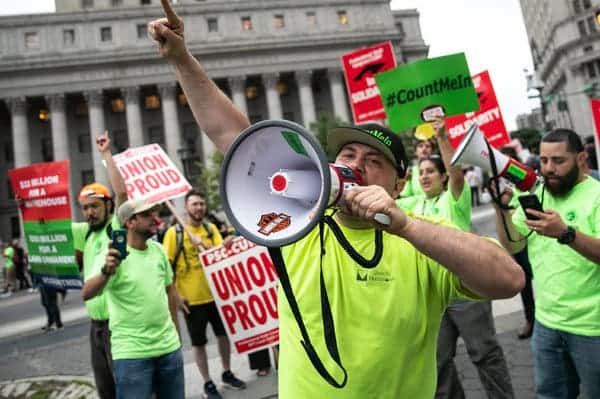
Minnie Che is a student at Harvard Law School.
Following up on Courtney’s post yesterday about an exception to the landmark ruling of Bostock v. Clayton County for businesses with fewer than 15 workers, a close reading of the Supreme Court decision by The Washington Post suggests that the Court’s opinion left open the possibility that religious exemptions could supersede LGBTQ protections. In the closing paragraphs of the opinion, Justice Gorsuch suggested that, in some circumstances, the First Amendment’s Free Exercise Clause and the Religious Freedom Restoration Act could override Title VII protections. According to The Washington Post article, the Supreme Court has had a strong record of protecting employers’ religious freedoms over the past two decades, including allowing prayer at government meetings. striking down limits on taxpayer funding for churches, and favoring a baker who refused to make a wedding cake for a same-sex couple. While the Court’s decision in Bostock is considered a major victory for LGBTQ rights, it still remains to be seen how courts will apply or limit this precedence in future cases.
While the ruling is a step in the right direction, there is still more work to be done. An opinion piece from New York Magazine posits that what is inherently harming LGBTQ and minority workers is the power imbalance between employer and employee, with at-will employment being one clear example. In at-will states, employers have the right to fire employees for any reason, barring discrimination on the basis of a protected class such as sex or race. And every state, with the exception of Montana, is an at-will employment state. And often, discrimination is not an explicit act but rather requires evidence showing a trend of discrimination or records of past conversations. This falls on the employee to gather evidence of these instances, which may be against human resources or confidentiality policies, to prove their case. Unionized workers may have collective bargaining agreements to include just-cause provisions to protect against this unrestricted action. Additionally, employers may also require nondisclosure agreements in employee contracts and severance agreements. The relationship between employer and employee is one that may continue to be redefined as labor laws evolve.
With protests for Black Lives Matter happening across the nation to fight racial injustice and police brutality, it brings up potential legal implications for what workers can say and do in the workplace and outside of it. A report from Bloomberg Law addresses the issue of what speech may be protected and what rights workers have to speak out without repercussions, suggesting that workers may have rights to protest racial injustice as part of a workplace condition. While there is no clear-cut answer, it may depend on the context of the protest. Fighting racial injustice can be framed as being in an employee’s interest, because it sufficiently applies to workers and the systemic racism of police brutality is also existent in other workplaces. The National Labor Relations Act protects workers’ rights to speak about their workplace conditions, and the National Labor Relations Board has the discretion to decide what kinds of speech should be protected between workers and their employers. These rights have been recently tested through social media speech and off-duty actions, with employers wondering whether they can fire someone for racist comments or conduct made outside of the workplace. These issues are significant in shaping an inclusive workplace environment for all employees.
Last week, prominent labor lawyer Susana Prieto was arrested by Mexican authorities at a protest after helping to organize strikes at US-owned factories in the city of Matamoros. She was charged with inciting violence and riots by the Mexican government. U.S. unions are calling for her release, as the imminent United States-Mexico-Canada Agreement (USMCA) is set to go into effect on July 1. There is increasing concern amongst unions that her continued detention reflects Mexico’s unwillingness to protect the rights of workers, which was the main purpose of the trade pact. A United Auto Workers union spokesman said that Prieto’s arrest and prosecution could send a chilling effect to workers who may not feel like they have a choice but to go to work under dangerous conditions. It also signals that the Mexican government may not implement the reforms agreed upon in the pact. The president of the AFL-CIO, Richard Trumka, has stated that Mexico needs to live up to its commitments to workers’ rights by dropping these fake criminal charges.






Daily News & Commentary
Start your day with our roundup of the latest labor developments. See all
July 11
Regional director orders election without Board quorum; 9th Circuit pauses injunction on Executive Order; Driverless car legislation in Massachusetts
July 10
Wisconsin Supreme Court holds UW Health nurses are not covered by Wisconsin’s Labor Peace Act; a district judge denies the request to stay an injunction pending appeal; the NFLPA appeals an arbitration decision.
July 9
In Today’s News and Commentary, the Supreme Court green-lights mass firings of federal workers, the Agricultural Secretary suggests Medicaid recipients can replace deported farm workers, and DHS ends Temporary Protected Status for Hondurans and Nicaraguans. In an 8-1 emergency docket decision released yesterday afternoon, the Supreme Court lifted an injunction by U.S. District Judge Susan […]
July 8
In today’s news and commentary, Apple wins at the Fifth Circuit against the NLRB, Florida enacts a noncompete-friendly law, and complications with the No Tax on Tips in the Big Beautiful Bill. Apple won an appeal overturning a National Labor Relations Board (NLRB) decision that the company violated labor law by coercively questioning an employee […]
July 7
LA economy deals with fallout from ICE raids; a new appeal challenges the NCAA antitrust settlement; and the EPA places dissenting employees on leave.
July 6
Municipal workers in Philadelphia continue to strike; Zohran Mamdani collects union endorsements; UFCW grocery workers in California and Colorado reach tentative agreements.